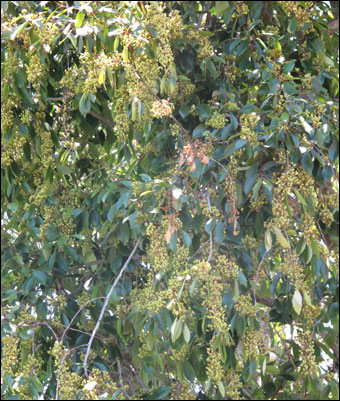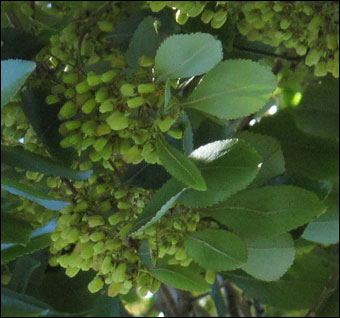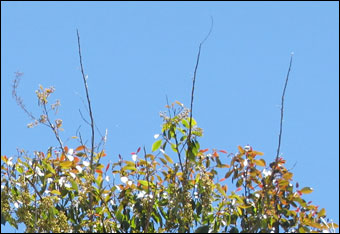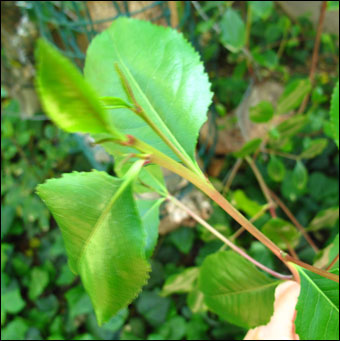Khat
 Catha edulis or Khat (also Qat, Jaad, Chat or Miraa), as it is more commonly known, is a shrub grown in many African countries. It is regularly imported to Australia by migrants who have come from African countries such as Somalia. The shrub’s leaf is generally chewed, or sometimes drunk as a tea, for its stimulant effect. There are some concerns about the social, health and economic impacts of the use of the drug, khat, in Australia. The enforcement of regulations related to khat has recently caused some community disquiet.
Catha edulis or Khat (also Qat, Jaad, Chat or Miraa), as it is more commonly known, is a shrub grown in many African countries. It is regularly imported to Australia by migrants who have come from African countries such as Somalia. The shrub’s leaf is generally chewed, or sometimes drunk as a tea, for its stimulant effect. There are some concerns about the social, health and economic impacts of the use of the drug, khat, in Australia. The enforcement of regulations related to khat has recently caused some community disquiet.
Professor Heather Douglas (T.C.Beirne Law School, The University of Queensland) and Dr Nicholas Lintzeris (Sydney medical School, University of Sydney) explored the use, legal regulation and law enforcement issues surrounding khat in 2010-2011.
This research was funded by the National Drug Law Enforcement Research Fund.
We thank you for your participation and interest in this research.
Contact details:
Professor Heather Douglas
h.douglas@law.uq.edu.au
tel: 07 3365 6605.
Some information about khat is available from the Drug Info clearinghouse:
The Australian Government has examined the regulation of Khat and other plants and drugs.
Research Outcomes:
-
Law enforcement and khat: An analysis of current issues
“Khat” refers to the leaves of the Catha edulis tree. While khat has been chewed for centuries by people in countries in the Horn of Africa region for its stimulant properties, in recent years its use in Australia has increased as more people from the region, particularly Somalia, have settled here. Drawing on focus groups conducted with over one hundred Somali and Ethiopian people in Brisbane, Melbourne, Sydney and Perth and on interviews with police service / force employees in those states, we examine current issues associated with the use and regulation of the plant and problems for law enforcement.
The authors would also like to thank Suresh Rajan, Former President of the Ethnic Communities Council of WA, for his assistance recruiting for focus groups in WA.
- H Douglas, A Hersi, 'Khat and Islamic Legal Perspectives : Issues for Consideration' (2011) 62 Journal of Legal Pluralism and Unofficial Law 95-114.
Abstract:
The leaves of the Khat plant are chewed for their stimulatory effect by many people who live around the Red Sea. People from this area have migrated throughout the world, bringing the practice with them. Consequently many countries have needed to address the question whether khat should be regulated. We argue here that, because khat use is mainly associated with Muslim people, the Islamic law about khat is also an important consideration in this debate. Accordingly this article explores the position of khat under Islamic law. In addition to a study of sources of Islamic shari’a, we have conducted focus groups with Somali people who had settled in Australia, and participants’ views are considered.
To access this article: contact your library or the authors.
- H Douglas, M Boyle, N Lintzeris, 'The Health Impacts of Khat: a Qualitative Study Among Somali-Australians' (2011) 195 (11/12) The Medical Journal of Australia 666-669
A Objectives: To identify patterns of khat use among Somali-Australians in Australia and to explore their views about the links between khat use and personal health.
Design, setting and participants: Qualitative study using semistructured focus groups among adult members of Somali communities in Brisbane, Sydney, Melbourne and Perth who volunteered to attend focus groups in January and December 2010.
Main outcome measures: Emergent themes related to Somali-Australians’ understanding of the links between khat use and personal health.
Results: Nineteen focus groups included 114 participants. Khat use was reported to be common among the Somali community, and more common among men than women. Khat was usually chewed in prolonged sessions, producing mild psychostimulant effects such as increased energy, enhanced mood, reduced appetite and reduced sleep. Khat was widely perceived to be a food, not a drug, and as harmless, or even beneficial, to the user’s health. Many users reported discontinuation effects such as lethargy, sleep disturbances and mood problems after sessions of heavy khat use, and some reported self-medicating with alcohol to cope with such problems. Problems of addiction to khat were identified by some participants, but not all believed it is addictive. Many khat users reported visiting their health professionals for treatment of adverse effects and failing to disclose their khat use.
Conclusions: Health professionals require greater awareness of khat use and related health problems. Health promotion activities targeting communities with high levels of khat use are required to increase understanding of the potential risks of regular khat use, to promote harm-reduction strategies, and to increase awareness of services available for those experiencing harm. Health professionals should consider targeted screening for khat use among individuals from Horn of Africa communities who present to health services.
- Heather Douglas and Merali Pedder, ‘Legal Regulation of the Drug Khat in Australia’ (2010) 18 Journal of Law and Medicine 284-301.
Abstract:
The plant Catha edulis, known more commonly as khat, has been consumed for centuries for its stimulatory effects, especially by people living in East Africa. As people from Somalia, Ethiopia and other East African countries have migrated to Australia, they have brought with them the practice of chewing khat. This article examines the claims made about the effects of khat on health and wellbeing and explores the approaches to the regulation of khat in Australia and overseas. The article concludes with a discussion of some of the concerns associated with current regulatory approaches and makes some suggestions for reform.
To access this article: contact your library, the publisher at: LTA.permissions@thomsonreuters.com or the authors.
Picture Gallery





